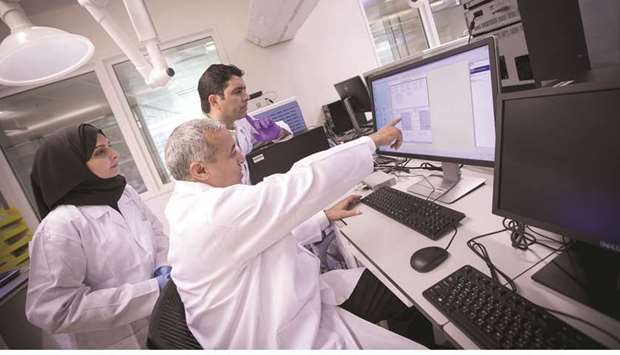The research initiative takes into account the complexity of the human body and various diseases and find more holistic biomedical solutions.
“The programme extends grants worth QR4mn per year for a period of three years which can be extended up to five years. The proposals for IDGP are screened by a team of local, regional and international experts. A peer review committee involving world leaders in the proposed field of research oversees the selection process,” Dr Omar El-Agnaf, acting executive director, QBRI told Gulf Times. “QBRI currently focuses on research in the area of diabetes, neurological disorders and cancer. While working towards improving personalised medicine, QBRI also looks at the potential for commercialisation through the IDGP,” he explained.
“The idea behind the initiative is to encourage researchers tackling common scientific challenges across QBRI’s research centres – Cancer Research Centre (CRC), Diabetes Research Centre (DRC), and Neurological Disorders Research Center (NDRC). While IDGP calls for the collaboration of multiple investigators from QBRI’s research centres, it can also involve partnerships with other national and international organisations,” continued the official. QBRI in consultation with several partners, has already identified some significant projects with relevant collaborators. Two IDGP projects that have been funded and hold promise as they continue to evolve and flourish, are in the area of diabetes and autism.
The project on diabetes aims to identify and validate biomarkers for diabetes complications and comorbidities such as nephropathy, stroke, and dementia. The outcomes could be useful in targeting patients with type 2 diabetes for early risk-factor reduction as well as to prevent or slow down the complications.
The project on autism focuses on identifying molecular biomarkers for the early diagnosis of this disorder. It also aims to enhance the understanding of the underlying mechanisms of autism pathophysiology. The outcomes could help the development of clinical targets for early intervention to prevent, delay, or reduce the severity of the disease.
As a disease-focused institute, QBRI has been working on several innovative projects. Scientists at the DRC are working in collaboration with Hamad Medical Corporation to understand the genetic causes leading to the clustering of diabetes in families.
Meanwhile, work is also being carried out on the molecular mechanisms of diabetes, specifically looking at developmental transcription factors and how they determine cell fate such as pancreatic development.
Studies at the DRC are also progressing in the area of stem cell in diabetes, to develop active pancreatic insulin-producing cells. A QBRI project in collaboration with the Qatar Biobank involves the investigation of the association of low salivary alpha-amylase levels with diabetes type 2 and obesity in the Qatari population.


